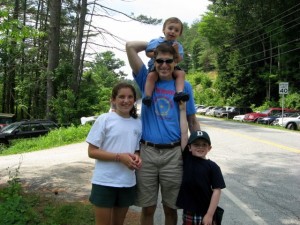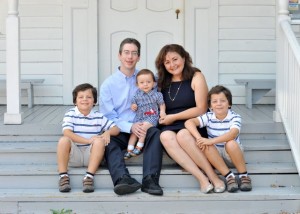Season 1, Episode 2
Our second hour-long episode of Freakonomics Radio is called “The Economist’s Guide to Parenting.” (You can listen or download via the link above, or read a transcript here. This episode and four more hours will be airing on public-radio stations across the country this summer at various times, so check out your local station’s website. And you can subscribe to the Freakonomics Radio podcast on iTunes or via RSS.)
I know what you’re thinking. You’re thinking what the **** — economists? What can economists possibly have to say about something as emotional, as nuanced, as humane, as parenting? Well, let me say this: because economists aren’t necessarily emotional (or, for that matter, all that nuanced or humane), maybe they’re exactly the people we need to sort this through. Maybe.
You may remember that we wrote a bit about parenting in Freakonomics; now we’ve put together an entire roundtable of economists to talk about a great many elements of child-rearing, with one essential question in mind: how much do parents really matter, and in what dimensions? So you’ll hear about parents’ effect on everything from education and culture cramming to smoking and drinking.
The economists include: our very own Steve Levitt; Betsey Stevenson and Justin Wolfers (both of whom show up on this blog regularly); Bruce Sacerdote; Joshua Gans (the author of Parentonomics: An Economist Dad Looks at Parenting; Melissa Kearney (whom you heard in our “No-Lose Lottery” podcasts); Valerie Ramey; and last but very, very much not least, Bryan Caplan (the blogger and author of Selfish Reasons to Have More Kids: Why Parenting is More Fun and Less Work Than You Think.
If you are like me, you will: learn a lot; gnash your teeth a lot; and laugh a lot.

Steve Levitt with his wife and four kids.
A few highlights:
LEVITT: So, I’m probably not a very good parent in the sense that I don’t obsess very much about my children’s success. I just kind of figure that everything’s going to turn out all right for them. And I probably wait far too long going down the path of things now turning out before we get involved. So, for instance, two of my kids were terrible readers for a long time. And they read fine now, but probably if I’d been paying more attention I would have been more troubled by it, I would have, you know, put them into tutoring programs and other things much more quickly.

Bruce Sacerdote and family
Bruce Sacerdote, whose research on adoption is featured prominently in the show, talks about some of the areas where nurture beats out nature:
SACERDOTE: You see that children are picking up their parents’ smoking and drinking habits with a very high degree of correlation, and it’s the same with the adoptees and the non-adoptees, they really pick up their parents’ habits, those type of habits explicitly. Another thing that’s undoubtedly contagious is that behavior of how you interact, how you treat other people, how you treat employees at a restaurant, or a retail store or something. I think those things are probably highly contagious as well.

Bryan Caplan with wife Corina, twins Aidan and Tristan, and baby Simon - named after the economist Julian Simon, who inspired his existence. (Courtesy Emily Korff of Veralana Photography)
And Bryan Caplan on the startlingly slim effect that parents seem to have on their children’s lifetime income:
CAPLAN: The Korean War orphans were adopted in the ‘50s and ‘60s at a time when it was much easier for low-income families to adopt. So, families were eligible as long as they were twenty-five percent above the poverty line, which would be quite unusual today. So, these kids were raised by a much broader range of the socio-economic spectrum than would happen to adoptees today. And yet, the finding of the study by Bruce Sacerdote was that the kids raised by the very poorest families grew up to have the same income as the kids raised by the very richest families. It’s striking that it’s the kind of thing that you would think of as being more about upbringing broadly defined than a lot of other traits. So it could be that it’s actual upbringing where your parents instill the value of a dollar and hard work in you. Or it could be something more like nepotism where because you get raised by the right kind of parents you get good connections, they actually make a phone call for you. And yet, actually the very best studies of the nature and nurture of income find that parents do have a moderate effect on your early income when you’re in your twenties, but basically zero for the rest of your life.

Justin Wolfers and Betsey Stevenson with the beguiling Matilda Sloan Wolfers (the only child to appear in our radio show) (Courtesy of Sarah Miller Photography)
You’ll probably hear more from Betsey Stevenson and Justin Wolfers in this hour than anyone else (as well as their beguiling 19-month-old daughter Matilda); they are very entertaining talkers when it comes to parenting. And candid too:
STEVENSON: I think that the hardest thing as a parent is to admit that you’re going to take risks with your child’s life, to actually admit out loud, I take risks with my child’s life. If you said that at a cocktail party, people would look at you like you were a monster. But of course we take risks with our lives everyday. I take Matilda out on to the sidewalk and we cross streets. Every time we cross a street we’re taking a risk. It’s not risk free to cross the street, or to ride the subway, or to go in the car. Almost everything we do has risks, and as economists I think Justin and I are really comfortable with thinking about risks and making decisions with them. And that means we have to face the really painful thing, which is we take risks with our child’s life.”

Melissa Kearney and offspring
And Melissa Kearney on how an economist mom talks to her kids:
KEARNEY: The way I explain things to my kids, I hear an economist talking to them. I mean, I explain everything to my kids in terms of opportunity cost. My daughter, when she was two in the grocery store, and I’m like, “Listen, you’re making choices and if you pick that you don’t get that.” Right, there’s a cost to your choices? And I’ll hear my son tell my daughter — they’re toddlers speaking — they’ll be like, “Look, you made a bad choice.”

Valerie Ramey with husband Gary, also an economist at UCSD; and their children Michelle and Sean.

Joshua Gans
Thanks to all the above economists and many others whose research we drew upon, and to everyone involved in producing the show. Additionally, here are a few of the research papers the show mentions or alludes to:
“Bargaining in the Shadow of the Law: Divorce Laws and Family Distress.”
“What Happens When We Randomly Assign Children to Families?”
“The Paradox of Declining Female Happiness.”
“Parental Education and Parental Time with Children“
Comments